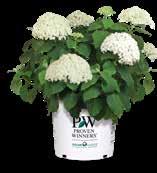








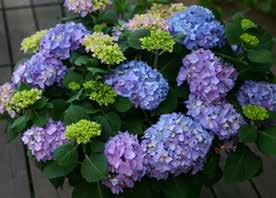
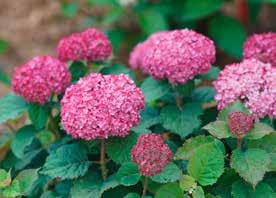

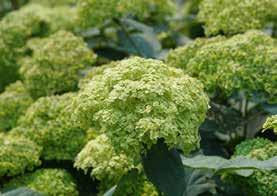
There are so many Hydrangeas on the market, that you may be lost for choice. This booklet will help you to choose the right Hydrangeas for your garden, but first some background.
We are a European network of enthusiastic plant growers! Our passion is to innovate and we are proud of bringing you new plant varieties. Breeding is either done by ourselves or by working together with our worldwide network of breeding specialists. Our mission is to provide the healthiest and strongest plants on the market so that everyone, even beginners, can enjoy a rewarding gardening experience.
Proven Winners® are a range of garden plants. They can be annuals, perennials or shrubs. Our criteria are that all plants should be easy to grow and maintain, offer something unique or different and that we can make them readily available across Europe. Very few plants are as thoroughly tested as Proven Winners®. All introductions are subject to a rigorous trial process which may take as long as five years. For the PW shrub range we test in Finland, the Netherlands, Michigan (USA) and Switzerland.
All our Hydrangeas are supplied with the bespoke white container with the PW logo. The tag or label comes in the form of a diamond shaped booklet with pictures and information about the plant.
Proven Winners® breeds strong and vigorous varieties, with a particular focus on pests and disease resistance. As a result, PW varieties require smaller amounts of insecticides and fungicides, if any. The selection process also looks at a higher heat and drought tolerance, so that PW plants perform well in a range of different climates and environments.
The containers we use for shrubs are all 100% recyclable and approximately 90% of the containers sold are made of 100% post-consumer recycled plastic. As of 2024 our labels are made of plastic with a recycled content of at least 30%.
We are committed to continue reducing the environmental impact of our packaging and production process.
01
Hydrangea arborescens, is one of the most winter hardy Hydrangea type but also the one that can withstand warmer climates. Often they are planted as flowering hedges. Most of the varieties used to have white flowers but breeding by Proven Winners® has led to varieties with other flower colours.
02
Cascade Hydrangea® , brand new and very innovative Hydrangea varieties with weeping branches that have numerous flowers on each branch. Cascade hydrangeas flower already in mid spring: earlier than other hydrangea varieties.
03
Panicle hydrangea (Hydrangea paniculata) have large, cone-shaped flowers. They start flowering in a white or light green colour but will transition spectacularly, to shades ranging from green and pink to hot red, depending on the variety. The strong stems of paniculata types become ‘woody’, allowing the shrub to reach a bigger height than most other types.
04
Hydrangea macrophylla is the most common type of Hydrangea and are often called hortensia. The macrophylla varieties can be divided between so called mophead types, with flowers shaped like big balls, and lace-cap types, with plate or saucer shaped flowers
05
Mountain hydrangea (Hydrangea serrata) originate from Japan and Korea, which also have lace-cap flowers but are in general better able to withstand cold winters. Serrata types will display a nice autumn leaf colour.
06
Oakleaf hydrangea
or Hydrangea quercifolia are easily distinguished by their different leafshape. Oakleafs flower best in areas with hot summers. Its flowers bloom white, green or pink. In autumn they will provide you with a wonderful show of orange to burgundy leaf colours.
Which one to choose?
There are over 20 Hydrangeas types or species of which five are most frequently used, and very suitable, for gardening.

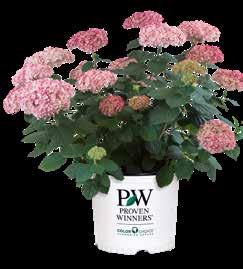
Proven Winners® arborescens varieties grow on all types of soil and are frost resistant to -30°C.
Flowering starts in early summer and lasts till early autumn. Flowers of all Proven Winners® arborescens varieties are supported by strong branches. Decades of research have resulted in the widest range of choices for you. You will find that our selection covers the most colours and sizes available in the market. On this page you will find the larger sized varieties, on the next page the small-sized varieties.

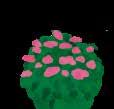



Normal arborescens struggle in rain and/or wind, with their heavy flowers quickly falling to the ground. PW breeders were the first to solve this problem, by achieving much stronger flower stems.

COLOUR lime green pink ruby red pure white lime green silvery pink
COLOUR
EVOLUTION to jade green to deep lime green to light green
FLOWERING summerearly autumn summerearly autumn summer summerearly autumn summer –late autumn summerearly autumn
HEIGHT FROM / TO 120/150 120/150 90/120 120/150 140/160 120/150
SPREAD FROM / TO 90/120 90/120 60/90 90/120 90/120 90/120
HABIT bushy bushy bushy bushy bushy bushy
MAIN FEATURE lime green flowers bottom to top unique pink colour deep red flower colour the original with strong branches heat resistant flowers huge silvery pink flowers
OTHER FEATURE abundant flowering continuous flowering long flowering long flowering perfect as cut flower long flowering
AWARD silver gold bronze bronze
FLOWERS ON NEW WOOD PH ACID / NEUTRAL / ALKALINE Lime Rickey® Pink Annabelle® Ruby Annabelle® Strong Annabelle® Sublime Annabelle® Sweet Annabelle®
FLOWER SHAPE: BALL PRUNING PERIOD: EARLY SPRING
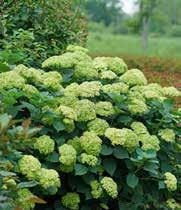
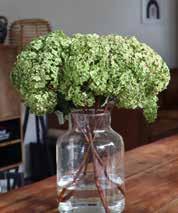
Hydrangea’s are wonderful garden plants but some Hydrangea varieties have an added benefit: they can also be used as a cut flower. Within the Proven Winners® range several of the arborescens and paniculata varieties are suitable for this.
Especially Sublime
Annabelle® with its big flowers that age to a deep lime green colour will look sublime in your flower bouquet!
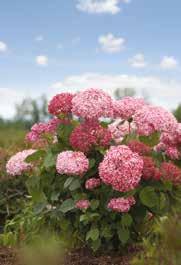
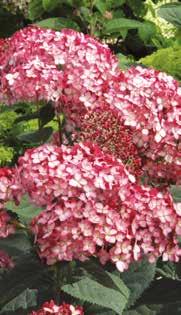
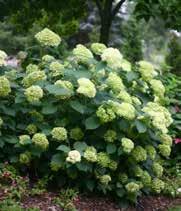
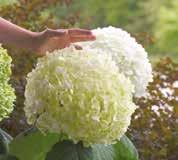
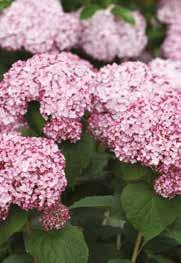
Within the Proven Winners® arborescens range, the BellaRagazza® form a special series. These are the first low-growing ‘Annabelle’ type hydrangea in the world, reaching only 40-90 cm high and therefore also suitable for in a pot on the terrace. Just like roses, you may want to ‘dead head’ faded flowers of Hydrangea arborescens. We have noticed that particularly BellaRagazza® Limetta responds very well to this by re-flowering abundantly.
BellaRagazza®
Blanchetta

BellaRagazza®
Limetta

BellaRagazza®
Mauvette
COLOUR white lime green deep pink-purple
COLOUR EVOLUTION starts pale pink to white green to light green
FLOWERING summer summerearly autumn summerearly autumn
HEIGHT FROM / TO 40/60 60/90 60/90
SPREAD FROM / TO 60/90 60/90 60/90
HABIT compact compact compact
MAIN FEATURE super small habit
small habit and green flowers small habit very strong branches
OTHER FEATURE long flowering continuous flowering long flowering
AWARD gold
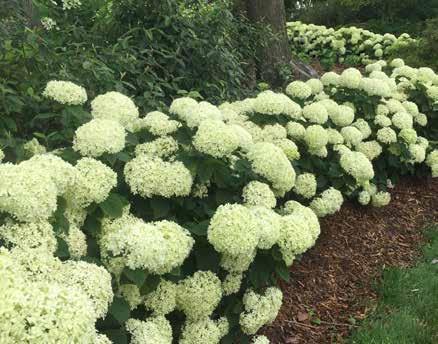
FLOWERS ON NEW WOOD PH ACID / NEUTRAL / ALKALINE
PRUNING PERIOD: EARLY SPRING
FLOWER SHAPE: BALL
BELLARAGAZZA ® LIMETTA -30°C
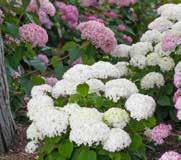
BELLARAGAZZA ® BLANCHETTA
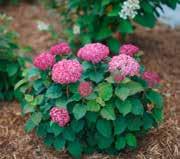
BELLARAGAZZA ® MAUVETTE

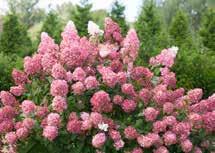
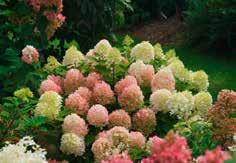

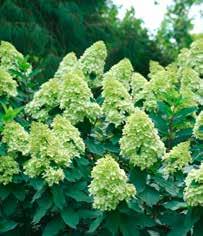
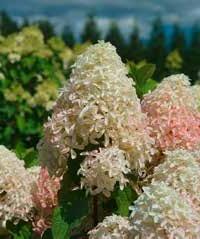
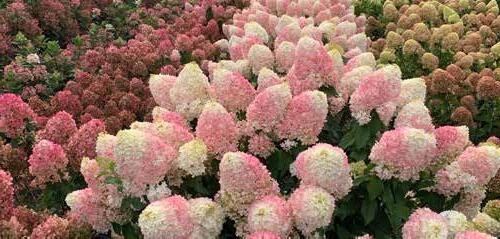
If you think you don't have enough space for a beautiful panicle Hydrangea, our small-sized varieties are here to help! For example, the innovative Tiny Quick Fire® is our smallest and most versatile selection yet. Perfect for the front of the border, for mass planting in rows or also suitable in a pot on the terrace.
180
150
120 30 0
60 90
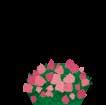

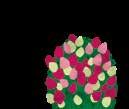


Fire Light Tiny Bit® Little Lime® Little Lime® Punch Little Quick Fire® Tiny Quick Fire®
COLOUR white lime green white and green white white
COLOUR
EVOLUTION to pink red to pink to pink, white, red, green to pink red to pink red
FLOWERING early summerlate summer early summerearly autumn early summerearly autumn late springsummer late springsummer
HEIGHT FROM / TO 60/90 90/120 90/150 90/120 40/60
SPREAD FROM / TO 60/90 90/120 90/150 60/90 40/60
HABIT mounded compact bushy mounded compact bushy compact bushy
MAIN FEATURE one of the smallest panicle Hydrangea bestseller festive mix very early flowering smaller than Fire Light Tiny Bit®
OTHER FEATURE long flowering abundant flowering long flowering compact habit early flowering
AWARD gold
FLOWERS ON NEW WOOD PH ACID/ NEUTRAL/ ALKALINE
FLOWER SHAPE: CONICAL PRUNING PERIOD: EARLY SPRING
Like our bigger-sized varieties the flowers of our small-sized varieties also undergo a beautiful colour evolution during their flowering period. Some of our panicle Hydrangea offer you something extra. The varieties Fire Light Tiny Bit®, Quick Fire Fab®, Little Lime Punch® and Little Quick Fire® continue their colour show in autumn with their wonderful autumn foliage colours.
We have grouped the PW macrophylla and serrata under one brand name, the Flair & Flavours®. In the Flair & Flavours® group you find a full range of colours and different flower shapes.
Soil chemistry determines whether your macrophylla or serrata will flower blueish-purplish or pink-reddish. More neutral or alkaline soils, with a higher pH, make the flowers of your Hydrangea tend towards their natural colour of pink and white. In general, an acid soil (with lower pH) will make the flower more blueish-purplish. Did you know you can influence this? By adding a small gift of ‘aluminium’ powder in autumn. Such powder is available in better garden centres.

Macrophylla types do need more feeding and moisture than other Hydrangea.


MAIN FEATURE abundant long flowering waterlilly shaped petals
reddish purple/ strawberry red flowers
flowers with a cute yellow centre flowers along the entire stem abundant long flowering abundant long flowering
OTHER FEATURE for terrasse and garden abundant long flowering abundant long flowering abundant long flowering abundant long flowering for terrasse and garden for terrasse and garden FLOWER SHAPE ball lace-cap lace-cap lace-cap lace-cap ball ball AWARD gold
FLOWERS ON NEW AND OLD WOOD
PRUNING PERIOD: OLD FLOWERS IN SPRING
PH SEE ABOVE
HABIT: COMPACT BUSHY
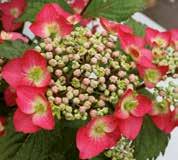
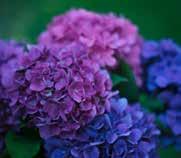
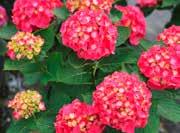
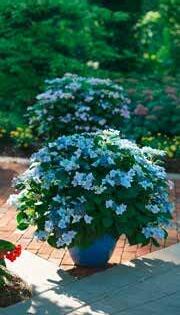
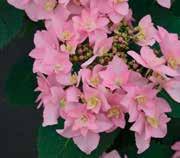
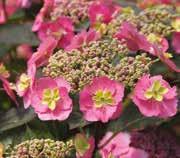
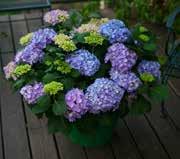
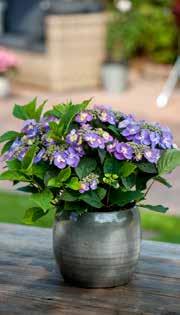
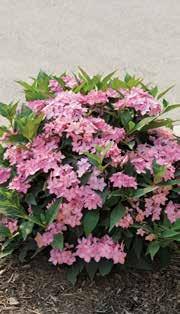
Proven Winners® quercifolia are all sold under the Gatsby® series name. Whereas most other Hydrangea’s leaf shape is rather ‘ordinary’ quercifolia really stands out in the crowd. Their leaves are deeply lobed, like most oak trees. Plant your quercifolia in moist but well drained soil, and give it some shelter in the first years so that it establishes quickly.
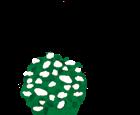

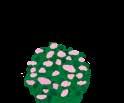
Quercifolia types start flowering white or green and change to red or pink as the season goes along. Gatsby® Pink is a fast mover, as it turns pink very quick, often within 10 days.

COLOUR white white white lime green COLOUR EVOLUTION to pink to green to pink to pink FLOWERING mid summer - early autumn mid summer - early autumn mid summer - early autumn mid summer - early autumn
bushy bushy bushy bushy
MAIN FEATURE huge flowers double flowers very fast colour change to pink star shape petals
OTHER FEATURE oak-shaped leaves oak-shaped leaves oak-shaped leaves oak-shaped leaves
We already mentioned that serrata and certain paniculata Hydrangea have nice autumn colour but quercifolia puts on an even more spectacular show. The dark green foliage changes to various shades of bronze, orange and reddish purple.
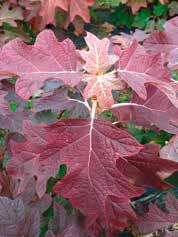
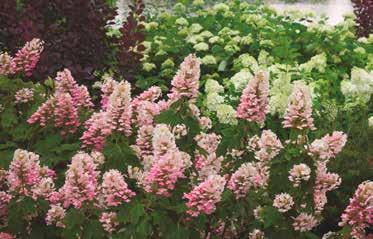
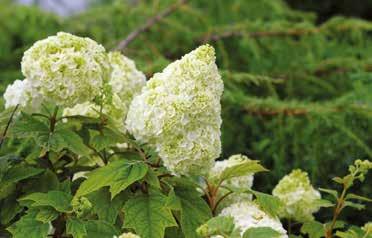
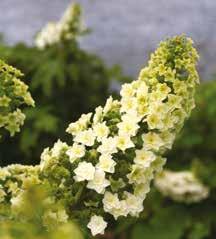
Autumn colour interest
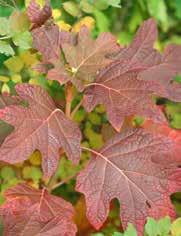
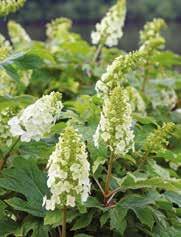
Most shrubs are best planted in autumn and Hydrangea are no exception. It allows your Hydrangea to establish itself and start growing ‘aligned with the seasons’. Early spring is a good alternative. As Hydrangea are not very demanding on soil type you will surely find a good spot in the garden. Most of them thrive in the full sun or half shade.
In general, Hydrangea with its shallow root system are notoriously water needy. Make sure that they are, and stay (!) moist by giving them regular and sufficient water. Watering is best done on the soil, particularly in sunny conditions. When the sun is out, wet flowers and foliage risk scorching. Also be careful, do not overwater as stagnant water might cause the roots to rot. We already told you about the rigorous selection criteria of Proven Winners® Hydrangea, and those criteria include drought tolerance too. The Proven Winners® Hydrangea generally tolerate drier conditions.
In our European trials some among them stood out during heat and drought of the 2022 summer. Most notably:
- arborescens Pink Annabelle®, Lime Rickey®
- Flair & Flavours® varieties:
* serrata Blueberry Cheesecake, Cotton Candy, Frozen Smoothie
* macrophylla Raspberry Lemonade
- paniculata Lime Light Prime®, Little Lime® and Fire Light Tiny Bit®
- the quercifolia Gatsby® varieties
Hydrangea is probably one of the strongest genera around to grow in your garden. Healthy Hydrangea are rarely prone to diseases such as mildew and do not seem be favourites of harmful insects such as lice, trips, vine weevil and white fly. In case you do have problems with pests and diseases try pruning them back first before you use chemical treatment.
01. Pick an area with full sun (or half shade) to plant your Hydrangea.
02. Make sure that the soil of the plant is moist.
03. Dig a hole with the same depth as the pot but about 2-3x as wide.
04. Mix the soil of the hole with some fresh compost.
05. Turn the soil at the bottom of the hole to aerate.
06. Then carefully remove the pot and loosen up the root system somewhat.
07. Position the plant in the middle of the hole with the top of the root ball just above the top level of the hole.
08. Fill the hole with the mixed soil, press the soil around the plant firmly with your hands.
09. Water the plant.
10. Apply a 5-7cm layer of mulch, but do not bury the stems or trunk.
In general pruning helps plants to become more bushy and stay healthy. The best period to prune your Hydrangea is very late winter and early spring. Before you start, check that the plants are (still) dormant, so without leaves and developing leafbuds. Always use clean scissors which reduces the risk of spreading disease. When you prune, make your cut just above a set of large, healthy leafbuds. If a branch is broken or dead, it can be removed completely. If in doubt, don’t prune! No hydrangea requires pruning to grow and flower well. For arborescens, macrophylla and serrata we can recommend to deadhead (remove spend flowers), this will increase the chance of reblooming.
Do note that between the 6 Hydrangea species or types described in this booklet there are some differences:
01. Arborescens types naturally make groundshoots and the older branches are best pruned back to half or a third of the original stems. In case of the shorter BellaRagazza® arborescens try to leave at least 15-20cm of old wood.
02. It is best to let cascading hydrangeas grow unhindered (remove dead wood only), this will result in the most abundant flowering.
03. Paniculata types respond well to strong pruning by becoming more compact, if you prune them lightly they will gain height.
I am alive!
Proven Winners® plants are natural & living products. We try to inform you to the best of our knowledge but do note that flowering period, flower colour and plant size are dependent on where you live, the type of soil and the weather conditions in a particular year.
04. Macrophylla and serrata make most of their flowerbuds on last year’s wood, so if you prune in spring you will get less flowers in summer. In spring simply tidy them up by taking off the old flowers. If you want the macrophylla and serrata to flower abundantly do not prune them too often, once every 3-5 years is enough.
05. Quercifolia support pruning down to half of the original stems but do not need a lot of it. After the plant has established itself it is really up to you.
Good cut
Too close to bud
Too far from bud
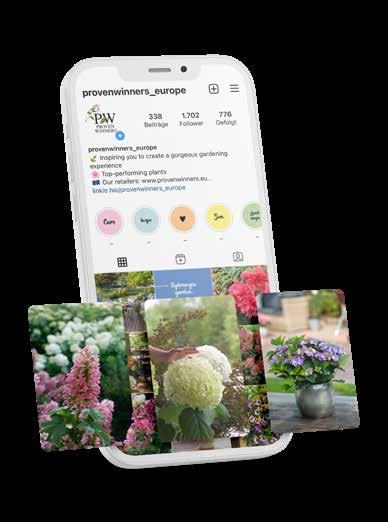
You can find your Proven Winners® Hydrangeas at better garden centres across Europe. Always look for the recognisable white container and the diamond-shaped label.
Visit our website www.provenwinners.eu to find a retailer nearby and to discover our broad range of Proven Winners® plants. Besides our wonderful Hydrangea collection, we offer many other unique and innovative varieties.
You can order Proven Winners® shrubs online through our webshop: www.provenwinnersplants.com. The webshop is currently active in 4 countries Germany, France, Belgium and the Netherlands. Other countries will be added but please feel free to contact us in case you live outside these countries in the meantime.
provenwinners_en provenwinners_europe
Proven Winners_en
Proven Winners_en
Proven Winners Plants
Proven Winners Europe shrubs
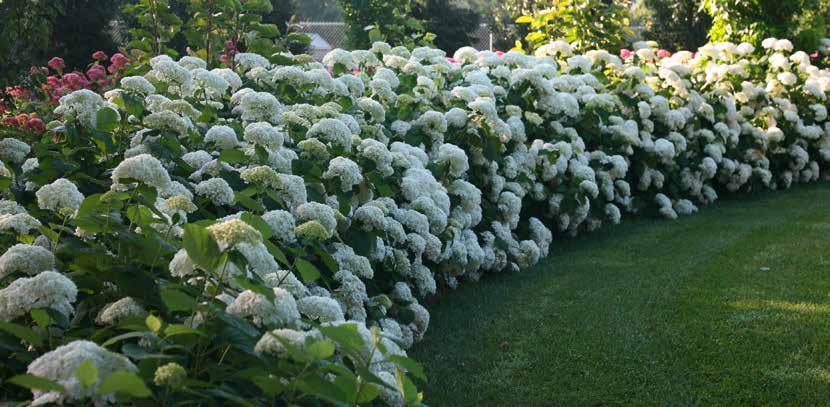
A better garden starts with a better plant

